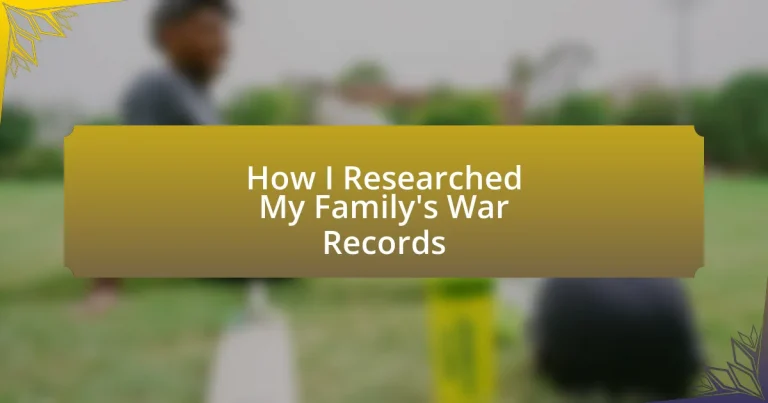Key takeaways:
- Family war records provide a deeper connection to ancestors, revealing their experiences and sacrifices during conflicts.
- Key resources for research include the National Archives, local historical societies, and online databases like Ancestry and Fold3.
- Engaging with veteran organizations can enhance research efforts by providing resources and personal stories.
- Documenting findings with emotional resonance transforms historical data into meaningful narratives of family history.
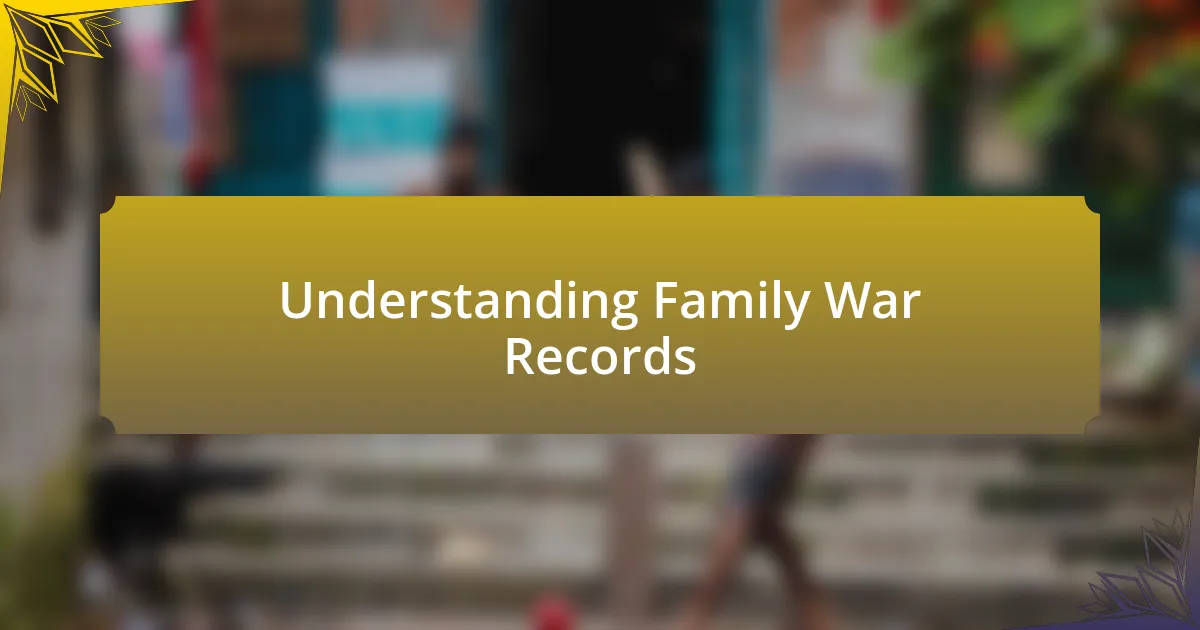
Understanding Family War Records
Family war records are more than just documents; they’re windows into our ancestors’ lives during tumultuous times. When I first encountered my grandfather’s enlistment papers, I felt a wave of connection wash over me. What had he experienced during those years of conflict? Understanding these records means recognizing the sacrifices made and the stories waiting to be uncovered.
As I delved deeper, I discovered that war records can include letters, medals, unit histories, and even discharge papers. Each artifact carries a weight of history that often evokes emotion. I remember reading a heartfelt letter my great-uncle wrote to my great-aunt from the front lines. It was a poignant reminder that behind each name is a story filled with hope, fear, and love—a narrative that profoundly enriches our understanding of family heritage.
When examining these records, questions often arise—such as how my family members made decisions during wartime, or how their experiences shaped the generations that followed. I’ve pondered how my grandfather viewed the world after returning home. In piecing these elements together, we not only honor their service but also create a richer, more personal tapestry of our ancestry. Such reflections make the process of researching family war records both an educational and emotional journey.
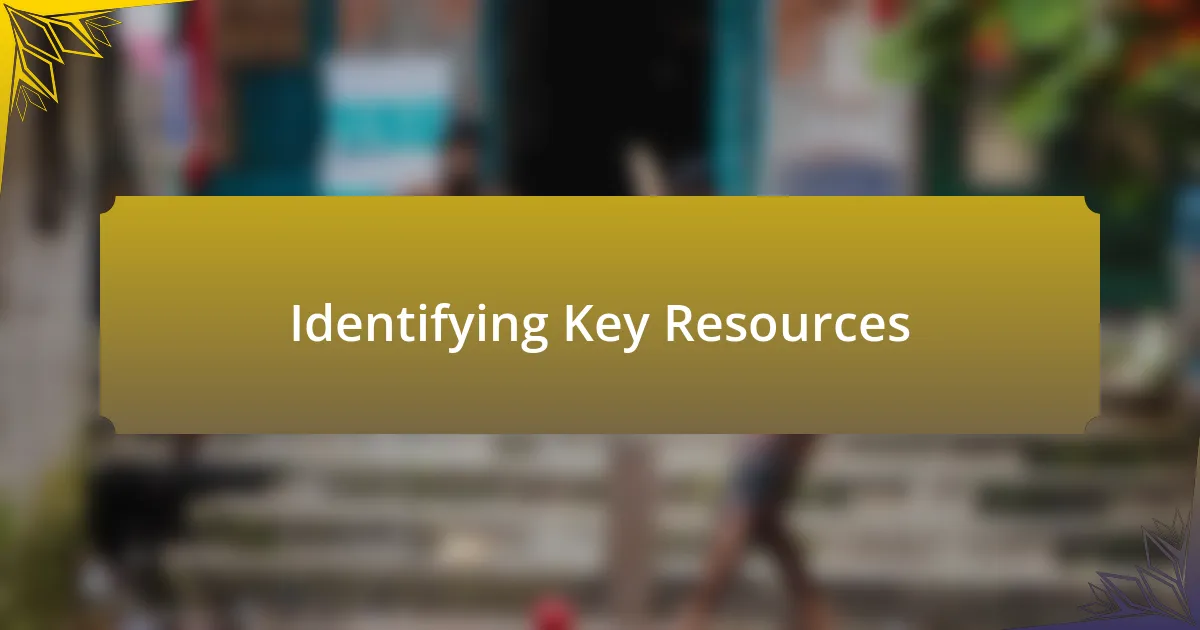
Identifying Key Resources
Identifying key resources for researching family war records can feel overwhelming at first, but I found it simpler when I focused on a few essential places. For me, the National Archives became a treasure trove of military documents and service records. I vividly recall the excitement I felt when I discovered my great-grandfather’s discharge papers there; it was as if I had unearthed a hidden part of my family’s past.
I also recommend looking into local historical societies; many have collections of letters, photos, and oral histories specific to veterans from the area. I visited one such society and was surprised to find a scrapbook that contained newspaper clippings about my great-uncle’s service. It struck me how a single scrapbook could encapsulate so many stories, deepening my connection to that era and the family members who lived through it.
Online databases have revolutionized the way we access these records. For instance, while researching, I used several genealogy websites that allowed me to connect and share findings with other genealogists. I remember the thrill when I found a distant cousin who had already tracked down information about our shared ancestor. This collaboration reaffirmed for me how interconnected our histories are, and how much more we can learn when we pool our resources.
| Resource Type | Description |
|---|---|
| National Archives | Houses official military records and documents. |
| Local Historical Societies | Provide access to letters, photos, and oral histories. |
| Online Databases | Allow for collaboration and connection with other researchers. |
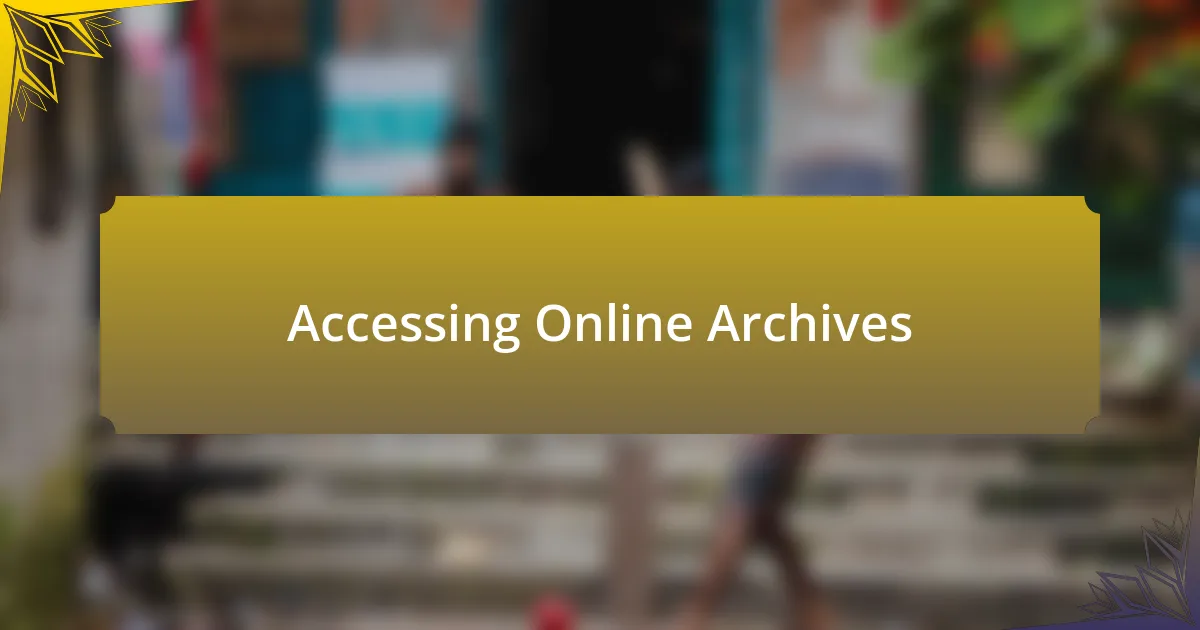
Accessing Online Archives
Accessing online archives completely changed my approach to uncovering my family’s military background. I remember the sense of anticipation I felt as I navigated various websites, captivated by the possibility of discovering hidden stories. Websites like Ancestry and Fold3 not only offered a wealth of digitized records but also connected me with other researchers who shared my enthusiasm. It’s remarkable how quickly I could gather information that often required days of in-person visits in the past.
- Ancestry: Offers extensive military records, including draft cards and service records.
- Fold3: Specializes in military documents, providing easy access to historical archives.
- FamilySearch: A free resource offering vast genealogical records contributed by users worldwide.
- Online Historical Societies: Many local and national societies now provide digital access to their collections.
- Social Media Groups: Platforms like Facebook have groups dedicated to genealogy, where members share advice and findings.
The thrill of sharing discoveries with these communities added a collaborative dimension to my research that I had never experienced before. It felt rewarding to see others excited about the pieces of information I had stumbled upon, further strengthening the narrative of our intertwined family histories.
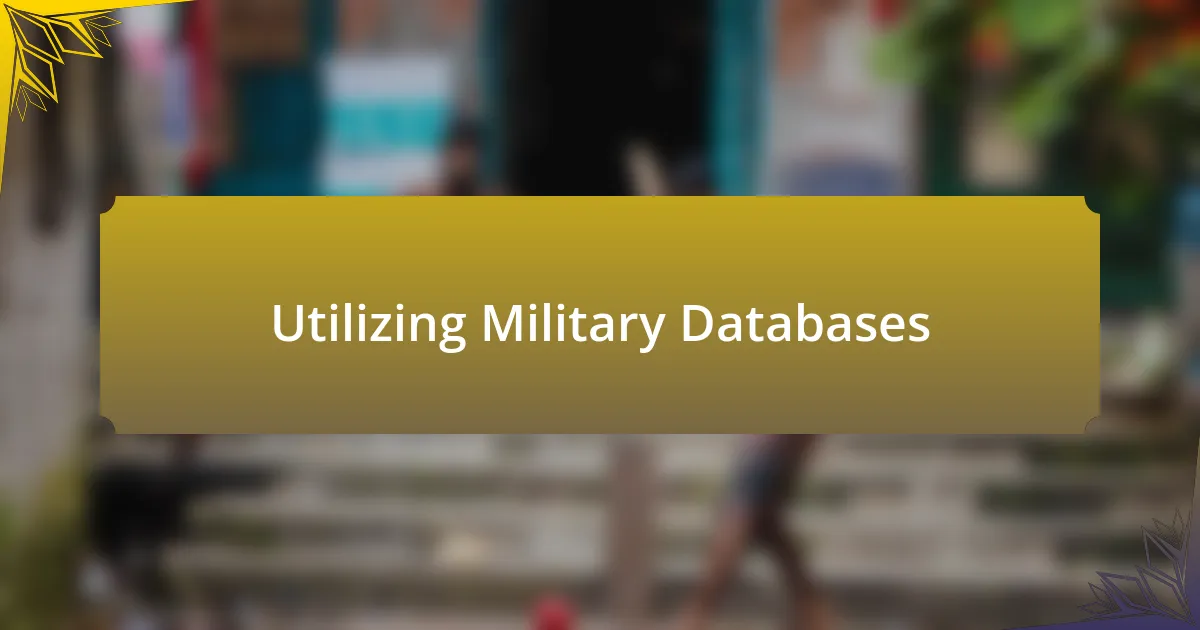
Utilizing Military Databases
I found that utilizing military databases was a game-changer in my quest to uncover my family’s military history. While searching Fold3, I unearthed my great-grandfather’s service records, and I vividly recall the moment I saw his name linked to a unit in World War I. It felt surreal, almost as if I had reconnected with a long-lost family member. Have you ever stumbled upon a piece of information that made your heart race? That’s the kind of rush I experienced while diving into these archives.
Navigating sites like Ancestry was equally eye-opening. I was initially overwhelmed by the vast array of resources available, from draft cards to campaign histories, all at my fingertips. Each click revealed a new layer to my family’s story, often accompanied by a sense of nostalgia and pride. When the details matched family anecdotes told during holiday gatherings, it made those stories come alive, blending the past with the present in a way I had never anticipated.
Moreover, I discovered that many local historical societies had digitized their collections, allowing me to access unique records from the communities my ancestors hailed from. One particular entry from a small-town archive included a letter written by my great-uncle while stationed overseas. As I read his words filled with hope and resilience, I couldn’t help but think about the powerful legacy they left behind. How often do we realize that history is not just dates and events, but the voices and emotions of the people who lived it?
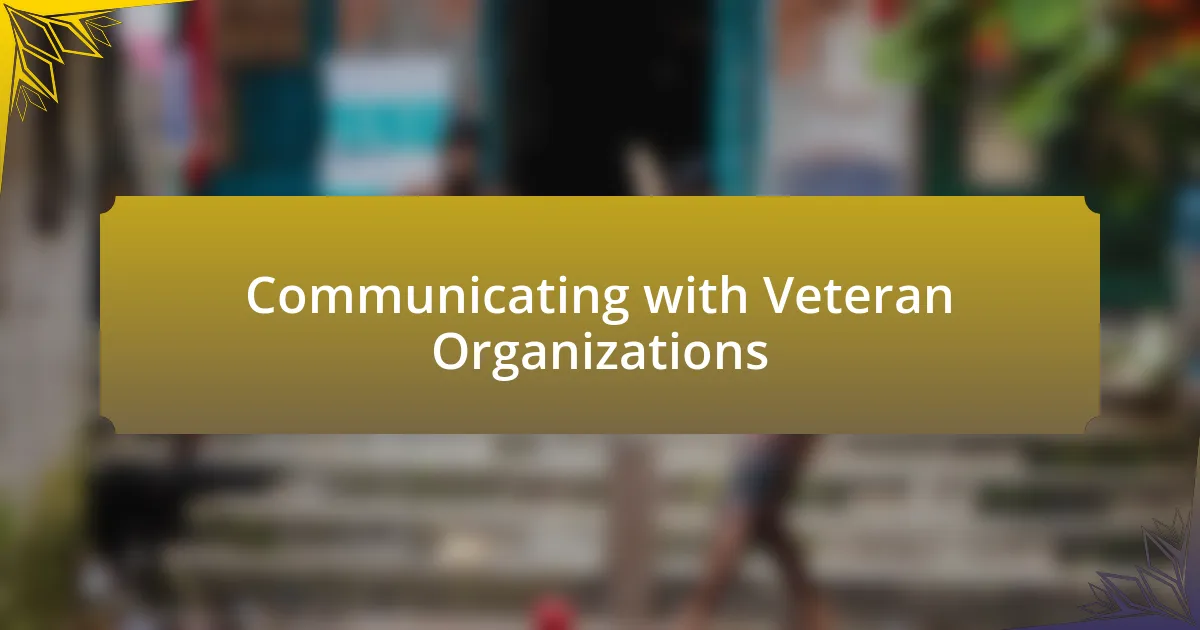
Communicating with Veteran Organizations
Reaching out to veteran organizations was a crucial step in my research journey. I remember contacting the local American Legion, hoping they could guide me with resources on my father’s military service. Their warm response not only provided me with helpful documents but also led to conversations with veterans who shared personal stories that echoed my own family’s experiences.
I was genuinely surprised by how welcoming these organizations were. Engaging in discussions with staff members and volunteers often felt more like a reunion than a simple inquiry. Their passion for preserving military history, combined with their willingness to assist enthusiasts like myself, transformed my search into a shared mission. Have you thought about how veteran organizations could bring your family’s history to life through their wealth of knowledge?
As I communicated with various groups, I learned about upcoming events and workshops focused on military history. Attending one such workshop opened my eyes to the network of people who are equally invested in uncovering their lineage. I remember sitting among others, each with their tales and questions, and feeling a profound sense of connection. Here, surrounded by fellow seekers of truth, I realized that the pursuit of family history is not just about dates and records; it’s about weaving together the intricate tapestry of our shared past.
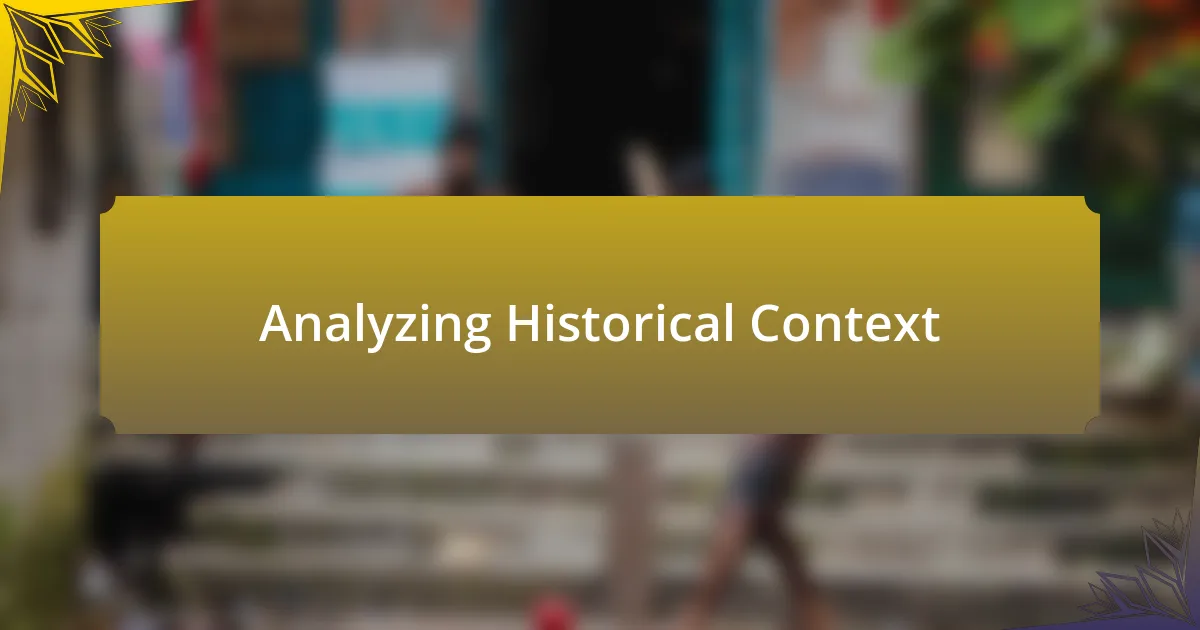
Analyzing Historical Context
Understanding the historical context of my family’s military records was pivotal. When I delved into the global events corresponding with my father’s service during World War II, it struck me how much those turbulent times shaped his experiences—and, ultimately, our family narrative. I often wondered how the battles he faced on distant shores could resonate through generations, influencing our values and perspectives today.
As I explored personal accounts from that era, I realized the profound impact of societal attitudes on soldiers’ mental health. Learning about the psychological struggles many veterans faced after returning home made me reflect on the unspoken burdens carried by my father. Have you considered how the historical narratives and cultural attitudes surrounding warfare might have affected your own family members?
In one instance, I discovered a letter my mother wrote during the war, filled with both longing and resilience. It provided a touching glimpse into the emotional weight of that time, revealing how deeply intertwined their lives were with the broader historical context. This revelation made me appreciate how such primary documents could enrich my understanding of family history, turning abstract timelines into living, breathing stories filled with hope and heartache.

Documenting Your Findings
Documenting your findings is a critical step in portraying your family’s military history authentically. After compiling records and personal accounts, I decided to create a structured document that highlighted key events and insights. In one section, I included the story of my great-uncle, who served in a lesser-known conflict. His bravery was documented in a small medal citation, but I found a photograph of him, smiling with a group of fellow soldiers, which brought his story to life in a way that words alone could not.
I also found it impactful to pair the military records with oral histories from older family members. During a family gathering, I listened as my grandmother shared vivid memories of my great-grandfather’s return home after the war. As she spoke, I scribbled notes, capturing her emotions and anecdotes. These personal touches transformed mere statistics into a rich tapestry of family lore. Have you ever considered how these stories could change the way you understand your ancestors’ sacrifices?
As I jotted down everything, I made sure to keep emotional resonance at the forefront of my documentation. For instance, I’ll never forget the serious tone my father used when recounting his father’s struggles after Vietnam. These conversations not only deepened my understanding but also captured the emotional weight these experiences carried. My documentation isn’t just about facts; it’s about weaving together the threads of experience that bring our family’s war history into sharp focus.
